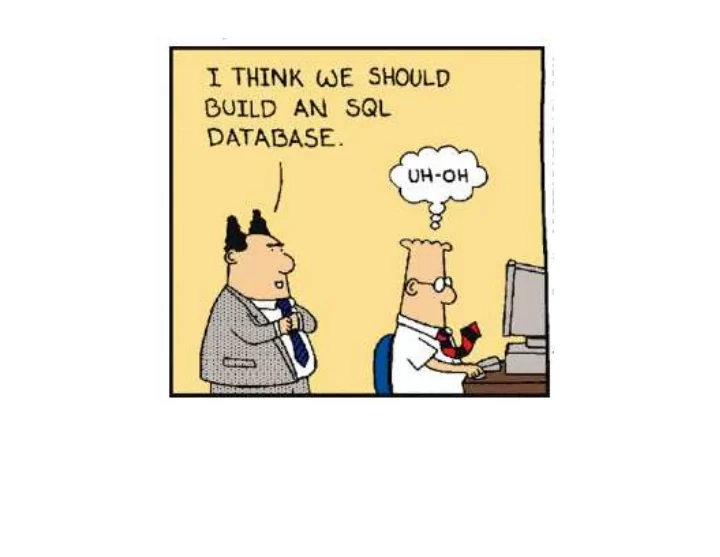

Databases
Standard stuff • Class webpage: cs.rhodes.edu/db • Textbook: get it somewhere; used is fine – Stay up with reading! • Prerequisite: CS 241 • Coursework: – Homework, group project, midterm, final • Be prepared to bring laptops every so often.
Class conduct • Be on time. • Raise your hand to ask a question. – Corollary: Raise your hand a lot! • Please raise your hand to be excused. • Turn off the computer screens when asked.
Group project • You will design and implement your own database-driven website. • Ideas: shopping, auctions, write a better BannerWeb, library/bibliography system, reviews a la Yelp, bank, finance/stocks, job postings, social networking a la Facebook, recipes, movies, apartments, … • Groups: probably 4-5 people, formed on your own. • Spread out over the whole semester; check-ins along the way.
How to succeed • Come to class. • Ask questions when you are confused: in class or office hours. • Take notes, preferably on paper. • Do not leave readings, homework, projects to the last minute. You can't BS (most) of these.
Why study databases? • Academic reasons • Programming reasons • Business (get a job) reasons • Student reasons
What will you learn? • Database design – How do you model your data so it can be stored in a database? • Database programming – How do I use a database to ask it questions? • Database implementation – How does the database itself work; i.e., how does it store, find, and retrieve data efficiently?
What is the goal of a database? • Electronic record-keeping, enabling fast and convenient access to the information inside. • DBMS = Database management system – Software that stores individual databases and knows how to search the information inside. – RDBMS = Relational DBMS – Examples: Oracle, MS SQL Server, MS Access, MySQL, PostgreSQL, IBM DB2, SQLite
DBMS Features • Support massive amounts of data – Giga-, tera-, petabytes • Persistent storage – Data continues to live long after program finishes. • Efficient and convenient access – Efficient: don't search the entire thing to answer a question! – Convenient: allow users to ask questions as easily as possible. • Secure, concurrent, and atomic access
Example: build a better BannerWeb • Professors offer classes, students sign up, get grades • What are some questions we (students or faculty) could ask? – Find my GPA. – … • Why are security, concurrency, and atomicity important here?
Obvious solution: Folders • Advantages? • Disadvantages?
Obvious solution++ • Text files and Python/C++/Java programs
Obvious solution++ • Let's use CSV: Hermione,Granger,R123,Potions,A Draco,Malfoy,R111,Potions,B Harry,Potter,R234,Potions,A Ronald,Weasley,R345,Potions,C
Hermione,Granger,R123,Potions,A Draco,Malfoy,R111,Potions,B Harry,Potter,R234,Potions,A Ronald,Weasley,R345,Potions,C Harry,Potter,R234,Herbology,B Hermione,Granger,R123,Herbology,A
File 1: Hermione,Granger,R123 Draco,Malfoy,R111 Harry,Potter,R234 Ronald,Weasley,R345 File 2: R123,Potions,A R111,Potions,B R234,Potions,A R345,Potions,C R234,Herbology,B R123,Herbology,A
Problems • Inconvenient – need to know Python/C++/Java to get at data! • Redundancy/inconsistency • Integrity problems • Atomicity problems • Concurrent access problems • Security problems
Why are there problems? • Two main reasons: – The description of how the files are laid out is buried within the Python/C++/Java code itself (if it's documented at all) – There is no support for transactions (supporting concurrency, atomicity, integrity, and recovery) • DBMSs handle exactly these two problems.
Relational database systems • Edgar F. Codd was a researcher at IBM who conceived a new way of organizing data based on the mathematical concept of a relation . (1970) • Relation: a set of ordered tuples (oh, no, CS172 stuff…)
Highlights of RDBMS • (R)DBMS = relational database management system. • Data is stored in relations, which resemble tables: First Last Course Grade Hermione Granger Potions A Draco Malfoy Potions B Harry Potter Potions A Ronald Weasley Potions C • Underlying data structures are more complicated.
Highlights of RDBMS • Users issue queries to the DBMS, which are handled by the query processor . – Behind the scenes: combining multiple tables, optimizing the query. • The transaction manager handles all the details of atomicity and concurrency.
On to the real stuff now…
Recommend
More recommend